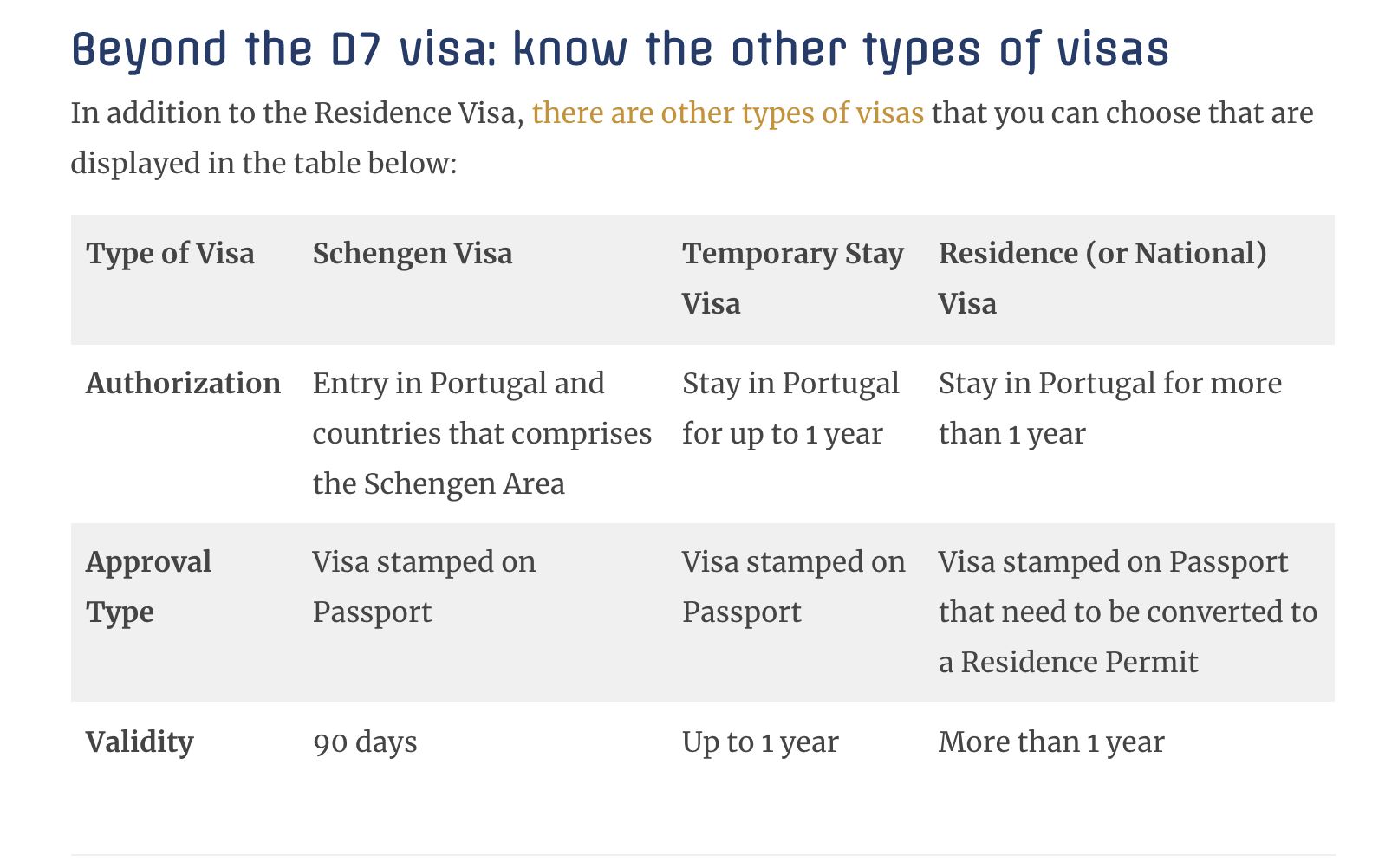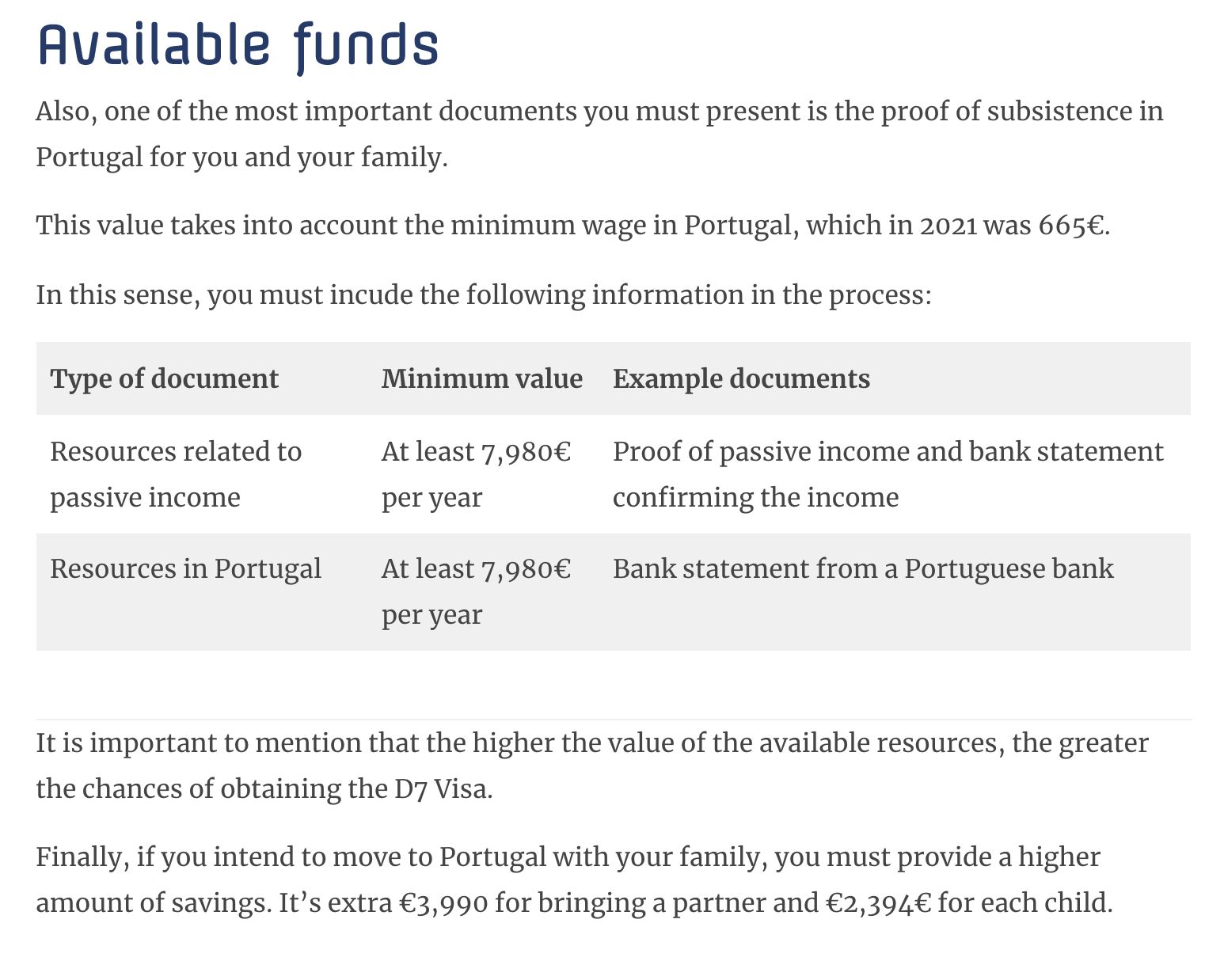
D7 Visa
Portugal is a very attractive destination for foreigners, especially those with passive income. It’s a great place to enjoy life, with great weather, tax benefits, and excellent quality of life. So if you’re someone with passive income, the D7 Visa is your way into Portugal.
We will analyze the entire procedure to apply and obtain a D7 Visa, who can get it, what you need to do, and much more. Follow up and start planning your relocation to Portugal with us!
What is the D7 Visa to Portugal
The D7 visa is intended for foreign citizens who have periodic passive income and want to live in Portugal. This visa, also known as a Visa for Pensioners or Retirees, gives its holder permission to enter Portugal and to get a Residence Permit. It is one of many existing visas, which we will explain before proceeding.
A brief consideration of all visas in Portugal
It is worth spending some time explaining the procedure that needs to be carried out to obtain any type of visa for Portugal.
Visas to live in Portugal
The initial procedure for obtaining a visa usually takes place at the Consulate of Portugal in your country of residence. The Consulate will make a prior analysis of the documents that you submitted. If they meet the requirements, the visa will be issued.
After obtaining the requested visa (which corresponds to an authorization stamped on your passport), the second step of the procedure starts. In this phase, you must apply for a residence permit directly in Portugal.
Country of residence
The initial procedure to apply for a visa for residence in Portugal at the local Portuguese Consulate.
In Portugal
The final step of the procedure. You already have a visa stamped in the Passport and must apply for a Residence Permit directly at the Foreigners and Borders Services (SEF), in Portugal.
Therefore, you will conclude this process in Portugal in person.
However, although we have presented the procedure for obtaining the Residence Permit, there are other types of visas and authorization if you want to enter Portugal, which varies according to the reason for residing in Portugal.
In this sense, it is worth emphasizing that the D7 Visa corresponds to the request for a Residence Visa for those who own a passive income.
This visa will enable its holder to obtain a Residence Permit in Portugal valid for 2 years, renewable.
Read also our complete article All About Visas to Portugal to see every one of them.

In this sense, the D7 Visa corresponds to one of the modalities of the Residence Visa, as it happens with the D2 Visa (business), the D1 Visa (work), among others.
The D7 Visa makes it possible for the applicant to obtain the Residence Permit once in Portugal.
After you, as a visa owner, remain in Portugal for a period of 5 years, you will even be able to apply for the Permanent Residence Permit and for the Portuguese nationality.
Requirements for the D7 Visa
To obtain the D7 Visa, it will be necessary to present some information and documents at the Consulate. Among the documents, proof of passive income is one of the most important.
D7 visa application to Portugal
See all the mandatory documents:
Proof of Passive Income: Documents that prove the monthly passive income.
Personal Statement: Declaration you must sign, specifying the reason for the visa application, the period intended to stay in Portugal and the place of accommodation.
Subsistence: Proof of income that allows residence in Portugal for a period of 1 year.
Accommodation: Proved by presenting the purchase or rental of a property in Portugal or an invitation letter signed by a citizen who legally resides in Portugal.
International Travel Medical Insurance: Valid for the residence period in Portugal. The insurance policy must include repatriation coverage for medical reasons, urgent need for medical attention and emergency hospital treatment.
D7 Visa form: Fulfill the form to obtain the D7 Visa. Any mistake in filling in may cause the rejection of the request.
Criminal record attestation: The criminal record from your country of origin, in accordance with local regulations.
SEF authorization: Authorization for the Foreigners and Borders Service (SEF) to consult your Portuguese criminal record, except for children under 16 years old.
Passport: Copy of the passport.
In addition to the aforementioned documents, you may have to submit others, depending on your situation. For this reason, we highly suggest the assistance of a professional in this process.
Time and cost of the D7 visa
The procedure to obtain the aforementioned documents usually takes about a month.
The analysis of the process by the Consulate of Portugal may take 30 days or more, depending on the documents presented.
After obtaining the D7 Visa, you will conduct an interview at SEF, in Portugal. Then, the Resident Permit will be issued in about 1 to 2 months, depending on which SEF the process took place.
You must also bear expenses related to the issuance of the title, which should correspond to approximately 150€.

Finally, if you intend to move to Portugal with your family, you must provide a higher amount of savings. It’s an extra €3,990 for bringing a partner and €2,394€ for each child.
To read the full article click here.
Article by VIV Europe - Official Legal Partner to KipperTree
